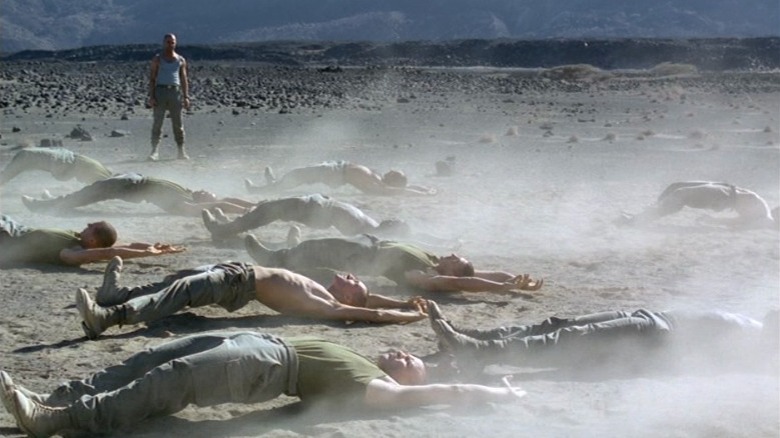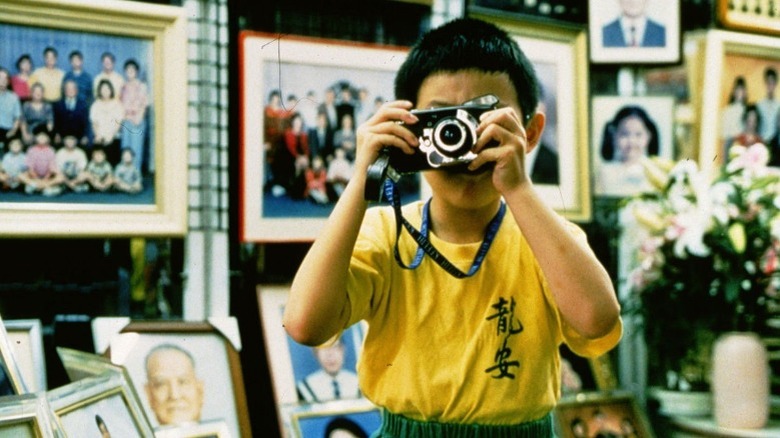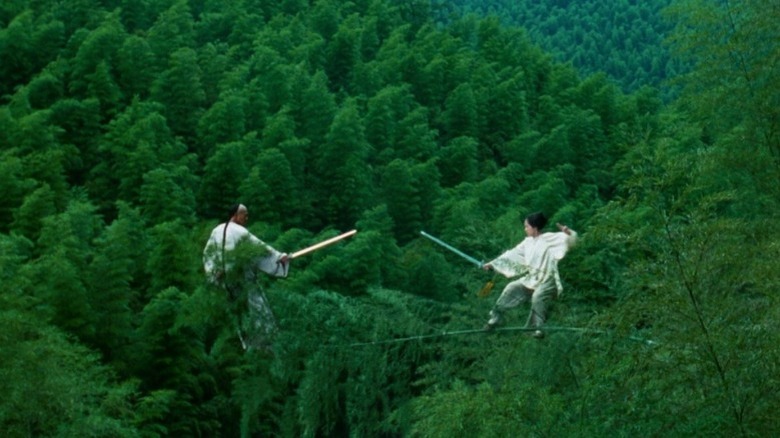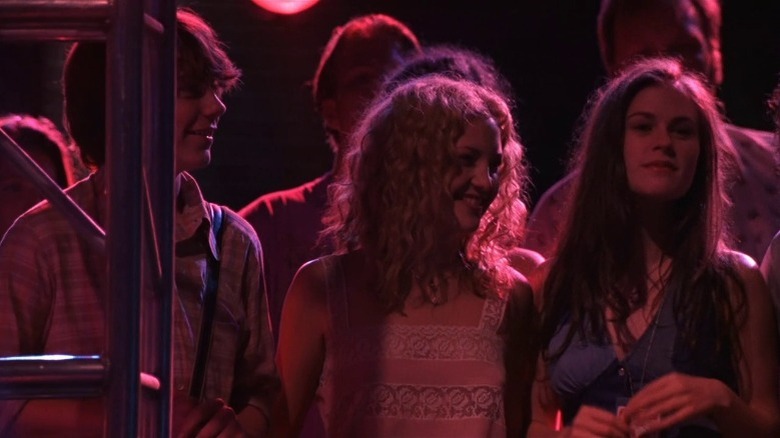There Are Only 4 Near-Perfect Movies From 2000, According To Metacritic
There's no such thing as a "perfect" movie, but the methodology of review aggregator Metacritic can be very helpful at picking out the ones that come close. Instead of gauging an "approval rating" based on the percentage of critics who liked a movie relative to the ones who didn't, Metacritic calculates a weighted average between the grades assigned by each publication, on a 100-point scale. This makes it very, very difficult for movies to achieve Metascores above 90, as that requires them to be not just liked but adored by a majority of reviewers. Only a small handful of movies pull it off each year.
Case in point: The year 2000. Remembered for the debut of the "X-Men" film franchise, the unlikely Oscar success of "Gladiator," and the box-office domination by off-kilter blockbusters such as "What Women Want," "Cast Away," and "How the Grinch Stole Christmas," the year that rang in the new millennium is not exactly the most talked-about one when it comes to memorable cinema seasons. It's certainly a far cry from the embarrassment of riches of, say, 1999 or 2017. And yet, 2000 still produced at least four modern classics, which accordingly landed in the 90s on Metacritic. Out of those four, two are arthouse masterpieces hailing from France and Taiwan, one is an international crossover hit, and one is an all-American epic comedy about the 1970s rock scene.
Beau Travail established Claire Denis as one of the great auteurs of our time
Technically a 1999 premiere, French director Claire Denis' "Beau Travail" didn't open commercially in the U.S. until March 2000, at which point it was immediately hailed as one of the year's must-sees. Telling the story of a former French Foreign Legion officer (Denis Lavant) and his time as a troop leader in Djibouti, Denis mostly eschews conventional drama and spends 90 minutes focusing on little more than sensation, movement, and visual splendor. The soldiers' training and missions are depicted as an elaborate ballet, full of symbolic nods to homoeroticism, masculine repression, and colonialist pathology, many of them inspired by Denis' own childhood lived out in various French colonies in Africa.
A radically unconventional and self-possessed work of art, "Beau Travail" left critics gaping and earned a Metascore of 91, with the Portland Oregonian's Kim Morgan stating it "easily is the most beautiful picture released in America so far this year, perhaps one of the most beautiful films ever made." Indeed, "Beau Travail" went on to be routinely cited as one of the best films ever — Vulture recently chose its stirring grand finale as nothing less than the best movie ending of all time. Denis, already a respected auteur by the time she made it, has since been catapulted to the status of one of the most revered filmmakers working, French or otherwise.
Yi Yi is the greatest of Edward Yang's intimate epics
Despite the breathless acclaim found by his movies in the 1990s and 2000s, the late Taiwanese director Edward Yang is still not quite as much of a household name as some of his arthouse contemporaries. That may be due as much to his preference for enormous runtimes — "Yi Yi" clocks in at two hours and 53 minutes — as to his way of filling them with slow, deliberate, observant storytelling. But, if the length of "Yi Yi" seems daunting to you, rest assured that every moment of it is worth it. As Entertainment Weekly's Liza Schwarzbaum puts it, "these 173 minutes don't drag, they waltz."
Occasionally known by its English title "A One and a Two," "Yi Yi" is, for all intents and purposes, Yang's masterpiece — or at least the movie that best summarizes his unique, underappreciated craft. An ambitious epic following the lives of three generations in a middle-class Taipei family, "Yi Yi" somehow manages to be as deep in poetic and emotional import as it is vast in scope, amassing little details and rhythms of everyday life into a whole so wise and affecting it feels almost like a second life through art. Yang won a richly deserved Best Director award at the Cannes Film Festival for it, and the movie was received with similar warmth in the English-speaking world, earning enough full marks to score a 93 on Metacritic.
Crouching Tiger, Hidden Dragon broke the glass ceiling for foreign-language films
Though American audiences are not the most receptive in the world to movies with subtitles, the U.S. box office has seen the occasional foreign-language hit over the years — "Pan's Labyrinth," "Amélie," "Life Is Beautiful," and, most recently, "Parasite" are a few examples. But no foreign-language movie produced outside the U.S. has ever come anywhere near the record held by "Crouching Tiger, Hidden Dragon."
An international co-production starring actors of Chinese descent from all over Asia, "Crouching Tiger, Hidden Dragon" is a martial arts film that pays tribute to the storied wuxia genre. It is set in the 19th-century Qing dynasty, the last imperial dynasty of China, and directed by the great Ang Lee, by then an established new talent in both his native Taiwan and the U.S. Like most wuxia stories, "Crouching Tiger" is too big and intricate to adequately summarize, but it begins with the sword of legendary swordsman Li Mu Bai (Chow Yun-fat) being stolen by a masked thief, prompting his warrior friend Yu Shu Lien (Michelle Yeoh) to chase after it. What follows is a sweeping amalgam of adventure, fantasy, political intrigue, and romance of the sort only wuxia can yield.
In addition to the enormous critical acclaim, including a 94 on Metacritic and the most Oscar nominations ever up to that point for a foreign-language film (via The Hollywood Reporter), "Crouching Tiger, Hidden Dragon" broke new ground in the U.S. box office. Its $128 million total intake — the first time a non-English film ever surpassed $100 million — remains unmatched to this day by international foreign-language productions (via Box Office Mojo).
Almost Famous is a modern American classic
When you hear the word "epic," what kind of movie forms in your head? Is it a dark, somber tale of power clashes? A decades-spanning period drama? Perhaps a large-scale historical adventure? As it happens, one of the most important American epics of the past 25 years is not anything of that sort, but a feel-good comedy about a teenage boy's escapade into the world of rock music in the 1970s.
Inspired by writer-director Cameron Crowe's own experiences as a 16-year-old music reporter (via The Uncool), "Almost Famous" is one of those movies that are virtually guaranteed to put a smile on your face. The distinction, in this case, is that the film manages to sustain that sense of joy and fun for all of a lengthy 122-minute runtime — and a whopping 162 minutes in the mandatory-for-fans director's cut.
The reason why the tonal gambit works is quite simple: the inner world of "Almost Famous" is exhilarating, and the movie takes its time to explore it to the fullest. As we follow William Miller's (Patrick Fugit) effort to write a Rolling Stone cover story about the concert tour of fictional rock band Stillwater, the movie lets us partake in the same sense of discovery and freedom as he did, laying bare all the high and lows and pains and pleasures of being caught in the eye of the '70s rock 'n' roll storm. Given extra pathos by the brilliant performances of Frances McDormand, Billy Crudup, and then-breakout star Kate Hudson, "Almost Famous" was a smash hit with critics in 2000, earning a Metascore of 90 and going on to win the Academy Award for Best Original Screenplay.




